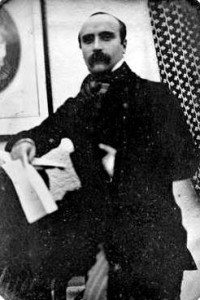by Virginia Euwer Wolff

For years I’ve taken primitive comfort in Gustave Flaubert’s mid-nineteenth century remark in a letter to a friend: “Last week I spent five days writing one page.”
And Garrison Keillor’s Writer’s Almanac reminded us (Dec. 12, 2014) that Flaubert often put in a comma one day and took it out the next. Yes, sure, fine, yeah, we all do that, and we can tell the keyboard, or the cat, whoever keeps us company, that in these insertions and deletions we’re honoring Flaubert and the noble tradition. But these hours of wifty indecisiveness may instead illustrate my own inability to perceive accurately, rather than Flaubert’s lofty aesthetic.
In this same Writer’s Almanac we hear that Flaubert said this (translated from the French):
It is a delicious thing to write, to be no longer yourself but to move in an entire universe of your own creating. Today, for instance, as man and woman, both lover and mistress, I rode in a forest on an autumn afternoon under the yellow leaves, and I was also the horses, the leaves, the wind, the words my people uttered, even the red sun that made them almost close their love-drowned eyes.
We’ve all been told: Write what you know. Some of us have rolled our eyes when we hear it. A couple of decades ago, Winnie Morris was the first author I heard say this to that: “Instead of writing what I know, I work at writing what I want to find out about.”
Ah, yes. Did Jean Craighead George know how she herself would live with wolves when she sat down to begin Julie of the Wolves? Did Tolstoy know how Kutuzov brooded? Had Jerry Pinkney ever been a majestic Serengeti lion in violent distress? We can bet that J.K. Rowling didn’t even know the Quidditch rules when she began.
My hunch: Gustave Flaubert, that man of scandalously racy mind, knew not a whit or a jot about actually being a horse or a leaf. I’m willing to guess that instead he paid scrupulous attention to things, cultivating a visceral sense of life in motion, an immersion in the drift of passionate giving and taking, using and being used, of hope, sorrow, envy, greed, kindliness, faith and faithlessness, of the plucky pulse of planet earth breathing. How else could he know about “love-drowned eyes”? And those things he had to learn about included horse and leaf. And he helped himself to them.
I think that must have been how he was able to force me to the front of my chair and cause me to plead, “Oh, no, Emma! Not him! Please, no!” Just as I want to leap from my seat and shout at Romeo in the tomb: “No! Don’t!” And to cheer Winnie Foster on as she makes her choice not to drink the water at Treegap. And every time I write “for deposit only” on a check, Dicey Tillerman comes to mind, and I thank Cynthia Voigt for letting me into that big story.
We set out to make a narrative nobody else has written. Of course it’s scary in there, that room or that cave we enter, alone, not knowing if those sounds are the voices of our story or of the forces that don’t want us to write it. As an article of faith, we pay attention. We examine the dripping walls of that cave, we find it’s the cave of our unconscious, and everything lives there: love and hate and envy and devotion and betrayal and exuberance and grief and uproarious laughter at what marvelously various fools we mortals be.
 Just now a female downy woodpecker is scooting up a pine tree outside my window. She doesn’t find an insect in every hole. She keeps hunting, hopping about, doing her work, going where she may never have been. I don’t expect ever to be her, but I certainly learn lessons from her tenacity, her routine of scooting, scampering, soaring.
Just now a female downy woodpecker is scooting up a pine tree outside my window. She doesn’t find an insect in every hole. She keeps hunting, hopping about, doing her work, going where she may never have been. I don’t expect ever to be her, but I certainly learn lessons from her tenacity, her routine of scooting, scampering, soaring.
As I’m considering Flaubert and wrestling with a recalcitrant manuscript, I’m reminded that Maurice Ravel took a year to compose the three and a half minute “Bacchanale,” the lush commotion that concludes his Daphnis et Chloé ballet. A year to move from the periphery, where it may have seemed easy, into the inviting and defiant heart of the matter.
Some faint melody, some shadowy story is waiting, just over there. Of course it’s been made before, and by wiser minds than mine. But maybe I can do it with a difference. Maybe. Make it an eighth-note just there. No, no, wait a minute: Make it two sixteenths. Yes, that’s it, exactly. No, I was wrong. Back to the eighth-note. Yes. I think.
